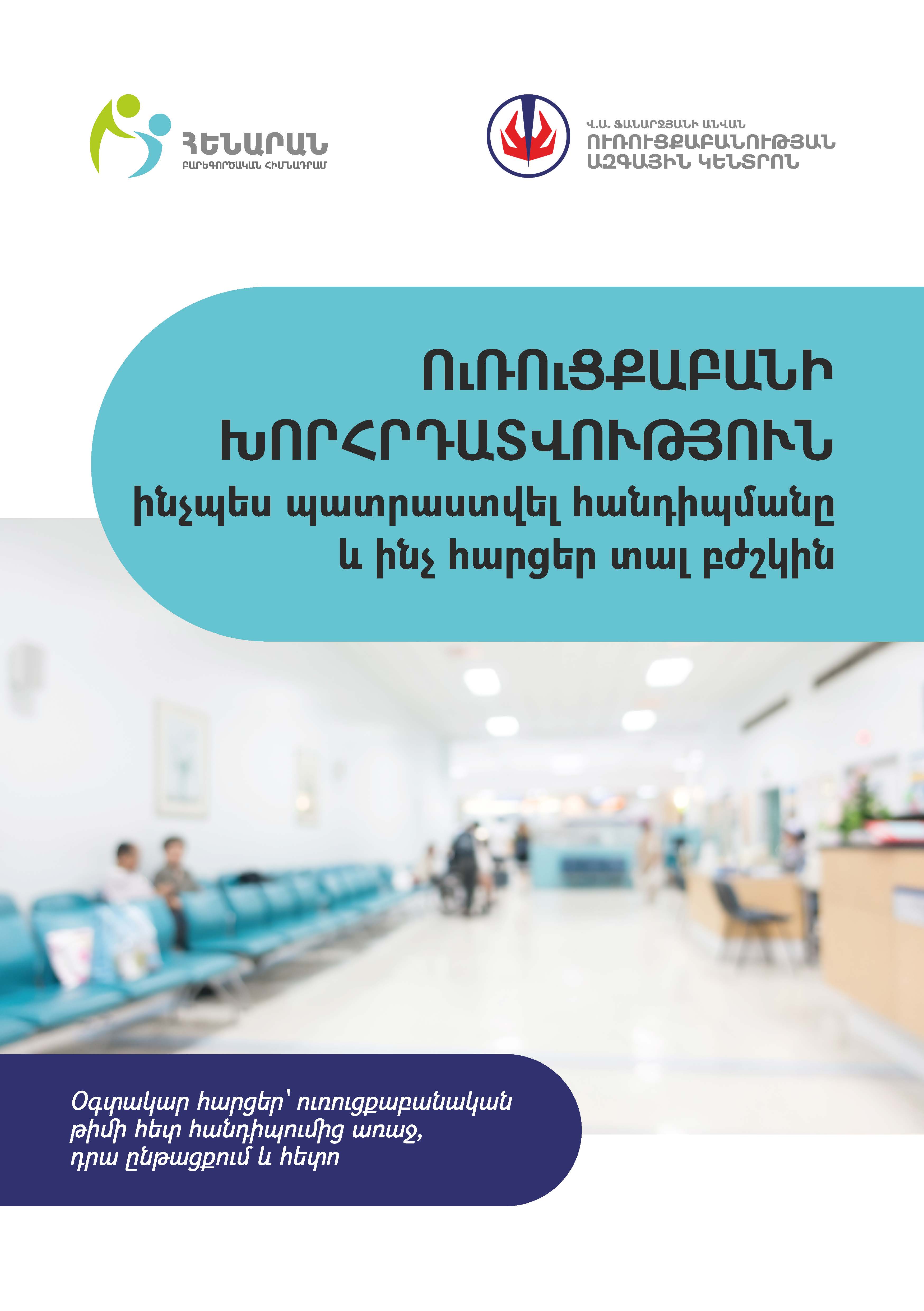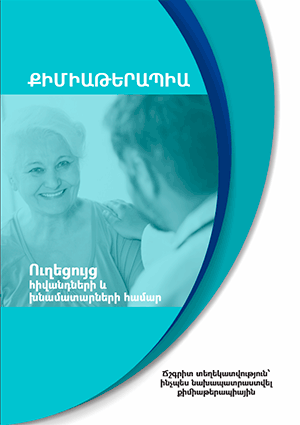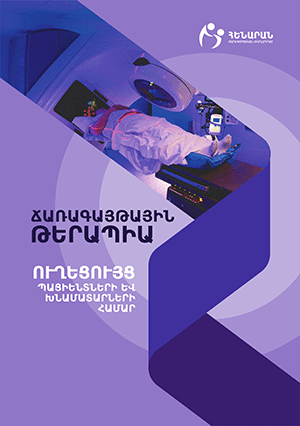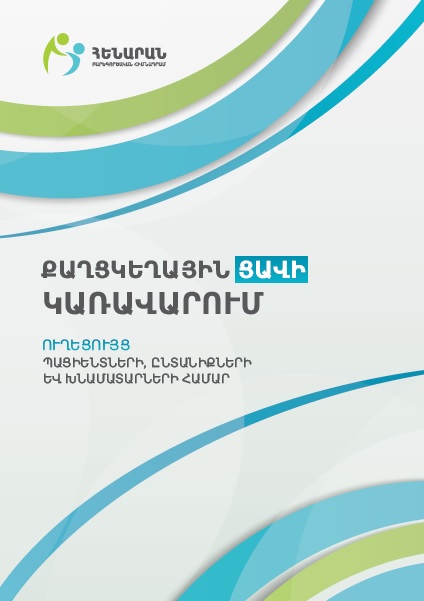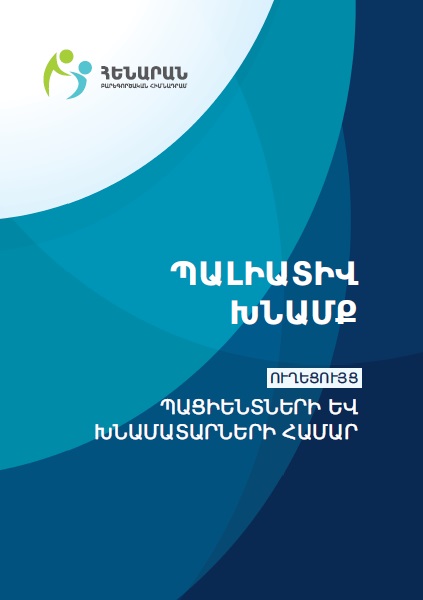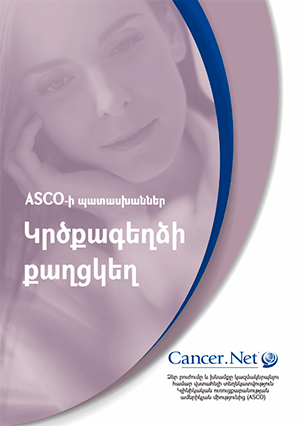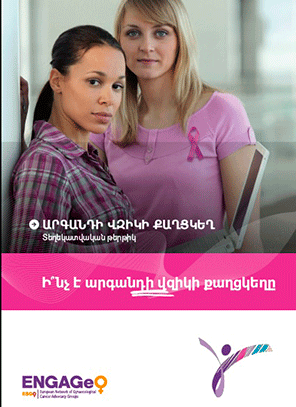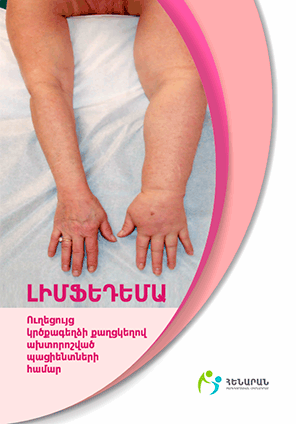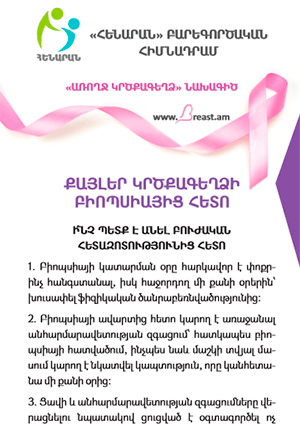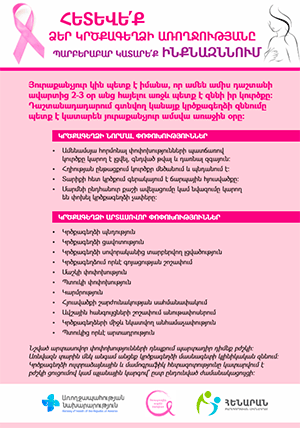Ask your oncologist
-
The patient guidebook, which has the title “The oncologist’s consultation: how to prepare for the meeting and what questions to ask the doctor?”, was developed by the initiative of HENARAN foundation and in collaboration with the National Center of Oncology after Fanarjyan under the Ministry of Health of the Republic of Armenia.
Oncologists often point out that patients and their relatives, when dealing with oncology issues, have no idea how to prepare for a doctor’s consultation and what questions they should ask to more efficiently spend their time with doctors. Therefore, HENARAN foundation developed this guiding checklist to help patients in their navigation and asking helpful questions before, during, and after meetings with the oncology team.
Some individual donors supported the publication of the guidebook, which is provided to patients free of charge.
Chemotherapy
-
The patient education booklet “Chemotherapy: a guidebook for patients and caregivers” was developed on the initiative of HENARAN charitable foundation as a response to the request of patients who voiced their need for appropriately guiding and educating materials on cancer care in Armenian.
The booklet is intended for patients receiving chemotherapy and their caregivers. Armenian doctors, in cooperation with cancer survivors and patient organizations, have gathered comprehensive information on many issues of concern to patients. The booklet covers in detail the possible complications and side effects of chemotherapy, as well as gives clear and concise advice on how to mitigate or prevent these and avoid possible mistakes.
In 2018 the US Embassy’s Democracy Commission Small Grants Program funded the compilation and translation of some materials, as well as printing of 6,000 copies of the booklet that are provided to patients free of charge.
Radiation therapy
-
The patient education guidebook “Radiation therapy: a guidebook for patients and caregivers” was developed on the initiative of HENARAN foundation as a response to the request of patients who voiced their need for appropriately guiding and educating materials on cancer care in Armenian.
The guidebook is intended for patients receiving radiation therapy and their caregivers. HENARAN foundation, in cooperation with Armenian doctors and cancer survivors, has compiled comprehensive information on many issues of concern to patients. The guidebook covers in detail the possible complications and side effects of radiation therapy, as well as gives clear and concise advice on how to mitigate or prevent these and avoid possible mistakes.
In 2021 the Embassy of the Netherlands in Armenia funded printing of 2,000 copies of the guidebook that are provided to patients FREE OF CHARGE.
Managing cancer pain
-
“Managing cancer pain: a guidebook for patients and caregivers” was developed by HENARAN foundation as a response to the request of patients who voiced their need for appropriately guiding and educating materials on cancer care in Armenian.
The guidebook is intended for patients having cancer-associated pain, as well as their caregivers. HENARAN foundation, in cooperation with Armenian doctors and cancer patients and survivors, has compiled comprehensive information on cancer pain management that is an issue of concern to many patients. The guidebook covers in detail the possible complications and side effects in the event cancer pain is not properly managed, as well as gives clear and concise advice on how to mitigate or prevent these and avoid possible mistakes.
Palliative care
-
“Palliative care: a guidebook for patients and caregivers” was developed by HENARAN foundation to help patients who need trusted and appropriate materials in the Armenian language that guide and educate both patients and their family members on provision of palliative care in Armenia.
HENARAN Foundation, in cooperation with Armenian doctors and cancer patients and survivors, has compiled comprehensive information to address many issues of concern for patients that may arise during the cancer-related palliative care. The booklet covers in detail the specificity of palliative care, its importance and necessity, provides clear and concise advice on how to arrange palliative care and avoid possible mistakes.
Breast cancer
-
This patient education booklet is the Armenian version of the publication “ASCO answers: breast cancer” compiled by the American Society of Clinical Oncology (ASCO). The special permission for translating this patient education material into Armenian was granted by ASCO to HENARAN charitable foundation in 2018. The information contained in this booklet is fully adapted for a non-professional audience. The original in English can be found here
The booklet contains valuable information on diagnosis and treatment of breast cancer, which has been compiled based on the experience of the world's leading cancer centers. The booklet is designed for breast cancer patients and caregivers to provide better understanding of the diagnostic and therapeutic measures, the treatment plan and the body’s reaction to treatment, as well as increase awareness about the disease and the latest treatment options available.
In 2018 the US Embassy’s Democracy Commission Small Grants Program funded the printing of 1,000 copies of the booklet that are provided to patients free of charge.
Cervical cancer
-
This information factsheet is the Armenian version of the English factsheet on cervical cancer published by the European Network of Gynaecological Cancer Advocacy Groups (ENGAGe).
The information contained in this factsheet is fully adapted for a non-professional audience, and the Armenian version complements a series of multilingual factsheets of more than 10 languages available here
The factsheet contains valuable information on diagnosis and treatment of cervical cancer, which has been compiled based on the experience of Europe’s leading cancer centers.
The information factsheet is translated into Armenian on the initiative and by resources of HENARAN charitable foundation and is provided FREE OF CHARGE.
Lymphedema
-
The patient education booklet “Lymphedema: a guidebook for patients diagnosed with breast cancer” is designed for women who receive breast cancer treatment and have a risk of developing lymphedema.
HENARAN charitable foundation, in cooperation with Armenian doctors and cancer survivors, has compiled comprehensive information on many issues of concern to patients, which may arise after surgery and/or radiation therapy prescribed within their breast cancer treatment plan. Patients can have better understanding of lymphedema, its symptoms, self-care for hand and arm, etc.
Some individual donors supported the publication of the booklet, which is provided to patients free of charge.
Breast biopsy
-
Many of you might have heard from a doctor, while still in the diagnosing process, that a biopsy is needed to either confirm or deny the suspicion of cancer occurrence.
In the event of a breast cancer, the biopsy verifies whether the lesion or suspicious area detected by the mammogram is cancerous (malignant) or non-cancerous (benign). The examination of a small tissue extracted through biopsy is the only way to ascertain and verify the presence of cancer cells.
More detailed information on what is a biopsy, its types and how it is handled on the breast can be found in the article Breast biopsy while the specific recommendations that should be observed after the breast biopsy is performed are presented in this patient information flyer.
Breast self-exam
-
Breast self-examination is still considered to be an effective method for early detection or diagnosis of benign and malignant neoplasms of the breast. Women who regularly perform breast self-exams, being well-informed and proficient in the right technique for performing a self-exam, are able to personally detect some early changes in their breasts.
Every woman should know that breast self-exam has to be performed every month, 2-3 days after the end of menstruation. Menopausal women should also regularly perform their breast self-exams on a specific day of each month (for example, the 1st, 3rd, or 5th).
While performing you regular breast self-exam you can follow the recommendations in this information leaflet.


